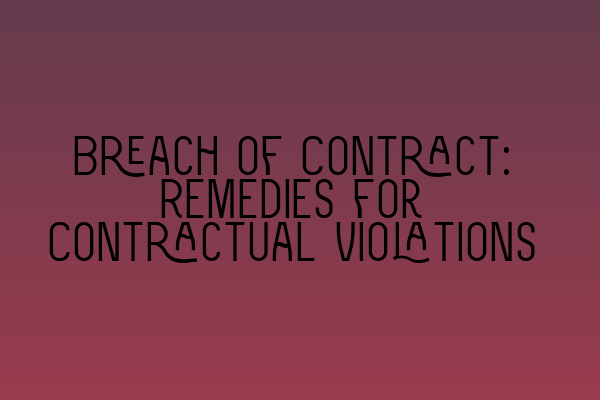Breach of Contract: Remedies for Contractual Violations
Contracts are the backbone of business transactions and relationships. They provide a framework for parties to define their rights, obligations, and expectations. However, there are instances when one party fails to meet their contractual obligations, leading to a breach of contract. When such breaches occur, it is crucial to understand the available remedies to protect your interests and seek appropriate compensation.
In this article, we will explore the various remedies for contractual violations, including damages, specific performance, and injunctions. Understanding these remedies can help you navigate the complexities of contract law and make informed decisions in case of a breach.
Damages
The most common remedy for breach of contract is the awarding of damages. Damages are designed to compensate the non-breaching party for any losses suffered as a result of the breach. There are different types of damages that may be awarded, including:
- Compensatory Damages: These damages aim to put the non-breaching party in the same position they would have been in if the breach had not occurred. It includes both actual monetary losses and foreseeable damages resulting from the breach.
- Consequential Damages: These damages go beyond the direct losses caused by the breach and consider the indirect or consequential losses that result from the breach.
- Punitive Damages: In certain cases, punitive damages may be awarded to punish the breaching party for their misconduct and deter similar behavior in the future.
It is important to note that the amount of damages awarded will depend on various factors, including the extent of the breach, the foreseeability of the damages, and any limitation clauses included in the contract.
Specific Performance
In some cases, monetary damages may not adequately compensate the non-breaching party. This is where the remedy of specific performance comes into play. Specific performance is a court order that compels the breaching party to fulfill their contractual obligations as stated in the contract.
Specific performance is commonly used in contracts involving unique or irreplaceable assets, such as works of art, real estate, or intellectual property. It ensures that the non-breaching party receives the exact performance promised by the breaching party, rather than a substitute or monetary compensation.
However, specific performance may not be available in all situations. It is at the discretion of the court to determine whether this remedy is appropriate based on the circumstances of the case.
Injunctions
Injunctions are another remedy for breach of contract, particularly when the non-breaching party wants to prevent the breaching party from taking certain actions. An injunction is a court order that prohibits a party from performing a specific act or requires them to perform a specific act, depending on the situation.
In contract law, there are two types of injunctions that may be sought:
- Prohibitory Injunction: This type of injunction prevents the breaching party from taking certain actions that may cause further harm or damage.
- Mandatory Injunction: On the other hand, a mandatory injunction requires the breaching party to take specific actions to rectify the breach of contract.
Like specific performance, the granting of injunctions is within the court’s discretion and is based on the particular circumstances of the case.
Conclusion
Breach of contract can have significant consequences for all parties involved. It is crucial to be aware of the available remedies to protect your rights and seek appropriate compensation for any losses suffered.
In this article, we discussed three main remedies for breach of contract: damages, specific performance, and injunctions. Each remedy serves a different purpose and may be applicable in different circumstances. Consulting with a solicitor specializing in contract law can provide you with the guidance you need to navigate through these complexities and ensure the best possible outcome.
Related Articles:
- LLC Formation Made Simple: Step-by-Step Guide for UK Entrepreneurs
- SQE Workshops and Webinars: Accelerate Your Exam Preparation
- Delaware Corporate Law for UK Solicitors: Key Insights and Practices
- Complying with Legal Obligations: Delaware LLCs in the UK
- The SQE for International Lawyers: A Bridge to British Legal Practice
